Iran Speaks Of An Upcoming 20-Year Cooperation Deal With Venezuela
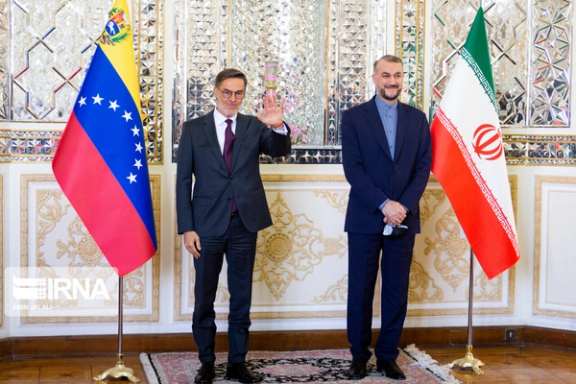
Iran’s foreign minister has said a 20-year cooperation agreement will be concluded with Venezuela during Nicolas Maduro’s trip to Iran in the coming months.

Iran’s foreign minister has said a 20-year cooperation agreement will be concluded with Venezuela during Nicolas Maduro’s trip to Iran in the coming months.
Hossein Amir Abdollahian spoke of the agreement during a joint press conference in Tehran with visiting Venezuelan foreign minister Felix Plasencia on Monday. He added that “We agreed to prepare a 20-year roadmap for cooperation between Tehran and Caracas.”
Iran has prepared a similar document with China, with its contents remaining obscure, which is a roadmap of expanded relations rather than a concrete bilateral treaty.
Amir-Abdollahian said a joint commission will prepare the document before Maduro’s trip to Iran.
While both countries are under heavy US sanctions which have pushed their economies into serious crises, Amir-Abdollahian spoke about Iranian goods being sold in Venezuela and investments opportunities in Iran.
President Ebrahim Raisi, who met with the Venezuelan foreign minister said later that Latin America “is a priority in Iran’s economic diplomacy” and a long-term plan must be prepared to “boost relations” to the maximum degree possible.
Plasencia said during the press conference that his trip to Tehran was his first foreign visit since he was named foreign minister in August.
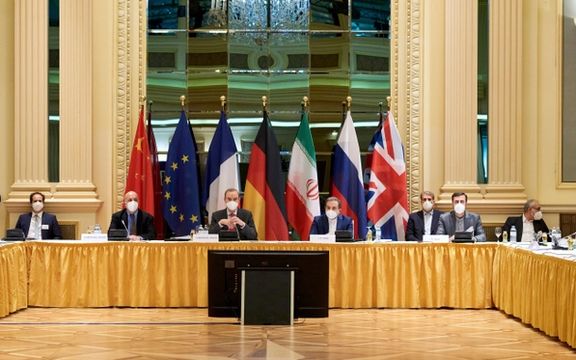
In confirming Monday their diplomats would meet in Brussels to review Iran’s stalled nuclear talks, EU foreign policy chief and Iran’s foreign ministry did not name a day.
For the European Union, Josep Borrell declined to confirm reports − citing an Iranian parliamentarian − that the meeting would be Thursday.
In Tehran, Saeed Khatibzadeh, spokesman of the foreign ministry, said that after a “constructive” visit last Thursday by Enrique Mora, the EU political director who coordinates the Vienna talks, Iran’s discussions with Europe would “continue in a few days in Brussels.”
The Vienna talks began in April but were suspended in June pending the Iranian presidential election and transition, but since then Iran has refused to return to negotiations. Aiming to restore Iran’s 2015 nuclear deal with world powers (the JCPOA, Joint Comprehensive Plan of Action), the talks failed to agree which United States sanctions needed to be lifted for Washington to return to the deal, which it left it 2018, and how Iran should bring its nuclear program back within JCPOA limits.
Neither the EU nor Iran has explained why they intend to liaise in Brussels. The Vienna talks formally involve all remaining parties to the JCPOA – China, France, Germany, Iran, Russia, and the United Kingdom – with the US taking part indirectly.
Asked about the future of the process as he arrived for an EU foreign ministers meeting in Luxembourg Monday, Borrell said he was “more optimistic today than yesterday.”
"No confirmation yet, but things are getting better and I am hopeful we will have preparatory meetings in Brussels in the days to come," he said.
New arrangement
In Tehran Khatibzadeh confirmed that the foreign ministry would continue to lead Iran’s diplomacy on the nuclear issue but with “a new arrangement.”
Asked if Ali Bagheri-Kani would take over the role as lead negotiator of Abbas Araghchi, whom he has replaced as a deputy foreign minister under President Ebrahim Raisi (Raeesi), Khatibzadeh confirmed Bagheri-Kani would lead the Iranian side in Brussels.
“Mr Bagheri will in his first opportunity present his views [opinions] to the European side,” Khatibzadeh explained.
A growing sense of urgency in European over the negotiations result results partly from concerns that the Raisi administration, which includes long-term critics of the JCPOA, will toughen Iran’s approach and partly from the experience Iran is gaining with an expanded nuclear program, which could undermine the non-proliferation calculations underpinning the 2015 agreement.
Khatibzadeh insisted that the onus in the nuclear talks lay in Washington. He also expressed Iran’s concerns over the value of any US commitments, given previous US president Donald Trump left the JCPOA unilaterally in 2018 and imposed ‘maximum pressure’ sanctions.
“All talk has been aimed at bringing back the US without preconditions to commitment to 2231,” he said, citing the United Nations Security Council resolution that endorsed the JCPOA.
“Our main goal is to make sure that all sanctions are ended and that decisions cannot be changed by anyone in Washington and there will be no games played against us. This can be achieved only in concrete talks.”
Discussions in Brussels, the spokesman said, would consider “the challenges and obstacles that were not bought to a conclusion (resolved) in Vienna.”
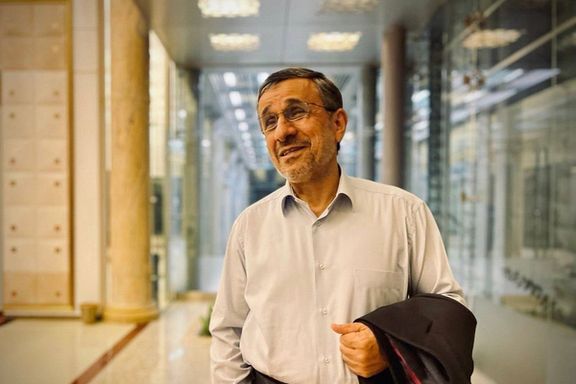
Mahmoud Ahmadinejad ended his Dubai trip on Sunday after the Iranian Consulate prevented him from holding a press conference, sources told Iran International.
Officials blocked reporters entering the venue, the Iranian Club Dubai, the sources in the United Arab Emirates said. The Iranian Club Dubai is a luxury hospitality center belonging to the state-affiliated ‘charitable’ Mostazafan Foundation. Later in the evening Ahmadinejad returned to Tehran prematurely.
This was the former president's first visit abroad since his second term ended in 2013. Media supporting Ahmadinejad had said that he was going to visit Expo 2020, a trade fair.
Principlist media claimed that Ahmadinejad had been deported by UAE police. It had become clear he was up to "political games and populist activities" that would undermine Expo 2020, Jahan News wrote Monday.
The reason for his early departure is not clear. It could have been a request by Emirati authorities or an order from Tehran for him to return.
The Revolutionary Guards-affiliated Fars news agency Sunday called Ahmadinejad's trip a "desperate attempt to be seen" that ended when he was "advised by UAE authorities" to return to Tehran.
Ahmadinejad's trip was well publicized by supporters and had sparked speculation a foreign travel ban had been lifted. Ahmadinejad criticized Supreme Leader Ali Khamenei for calling the June 18 presidential election an "epic" event, after he was barred from the poll. Ahmadinejad’s presidency saw him disagree with Khamenei, notably when heboycotted government meetingswhen the leader insisted that Heydar Moslehi remain intelligence minister.
Ahmadinejad gave an interview in Dubai to Independent Persian website covering relations with the United States, the Taliban, Saudi Arabia, the nuclear issue, Syria, and Yemen.
In the interview Ahmadinejad said he would not call himself an opposition figure. "I'm an Iranian and like any other Iranian I have a right to live and to express my views," he said. "If now someone is sitting at the head of the state, the country is not his, the country belongs to everyone and everyone has a right to express their views.”
In a video taken at Tehran's International Imam Khomeini Airport after his return, Ahmadinejad said he had intended to stay in Dubai three days but had extended his visit for two more. He promised "a full report” on his visit.
Some Iranian media last week published photos of Ahmadinejad with a woman claiming it was taken at the Israeli pavilion at the trade fair, while pro-Ahmadinejad media denounced this as a trick to tarnish Ahmadinejad's image. "Whoever says Ahmadinejad visited the Zionist regime's pavilion is a Mossad agent," Mohammad-Hossein Heydari, a pro-Ahmadinejad journalist tweeted.
Pro-Ahmadinejad lawmaker Ahmad Alireza-Beigi, who accompanied him to Dubai, dismissed an attempt to mislead the public. "The publication of this type of misinformation proves that Ahmadinejad's international popularity has worried those who lack such popularity and don't have similar travel chances," he said.
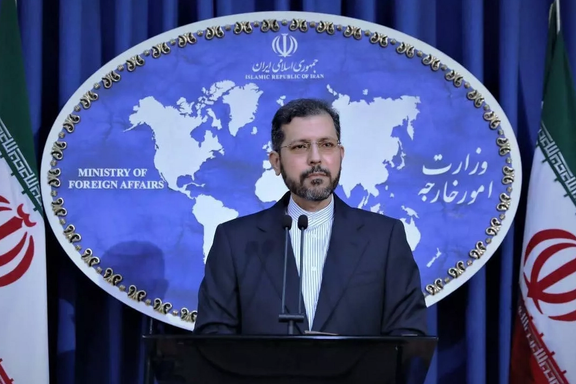
Iran’s foreign ministry spokesman, Saeed Khatibzadeh has said on Monday that talks with Saudi Arabia “have been cordial and to the same degree serious”.
Khatibazadeh who was speaking to reporters during his weekly briefing, said that so far four rounds of negotiations have been held in Iraq and “talks have taken place in a friendly and positive atmosphere.”
Saudi Arabia and Iran severed diplomatic ties in January 2016 when mobs attacked and ransacked the Saudi embassy in Tehran and its consulate in Mashhad.
Riyadh later supported former US president Donald Trump’s decision to withdraw from the 2015 nuclear deal (JCPOA) and impose tough sanctions on Tehran.
Khatibzadeh did not offer any details to reporters but said that talks should be allowed to proceed at the negotiating table. He denied reports that a Saudi delegation might soon visit Iran.
Iran has so far presented a more optimistic picture of the talks while Saudi Arabia has said they have been “exploratory”.
The United States and its European allies who have been holding talks with Iran over its nuclear program have also raised the issue of Iran’s interventionist policies in the region. Iran might be interested to present its talks with Saudi Arabia as a counterweight to their arguments.
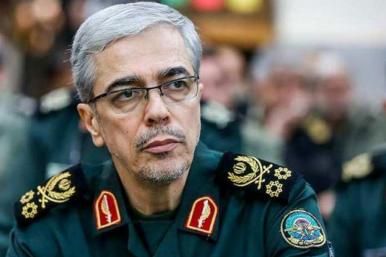
In a visit to Moscow on Monday, the head of Iran’s Armed Forces Joint Staff Mohammad Bagheri said that Afghanistan is a special issue for bilateral discussions.
General Bagheri said that Iran has always had cooperation with Russian armed forces, and in recent years the cooperation has expanded.
“I have been invited by the Russian defense minister and in addition to bilateral military issues that need follow-up, Afghanistan is among special issues that both sides will discuss,” Bagheri maintained.
He added, “Events in Afghanistan definitely have impact on regional counties, including the Islamic Republic, the Russian Federation and others and we will talk about these.”
Iran and Russia are military allies in Syria since 2015, when Russia deployed its air force in the war-torn country to defend the rule of Bashar al-Assad. With ground forces Iran supplied and with Russian air power, the anti-Assad armed opposition was largely defeated.
Bagheri also spoke about defense cooperation with Russia since the lifting of a United Nations arms embargo on Iran last October and said Iran has plans of weapons purchases from Russia. He also stressed the need to continue cooperation in Syria.
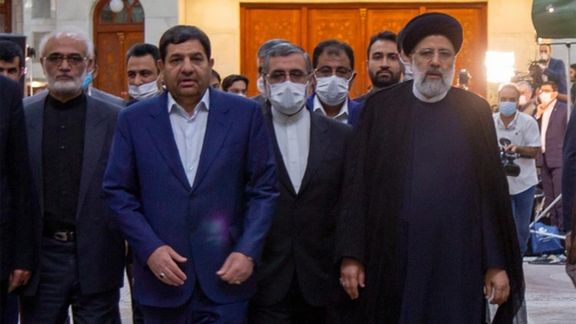
More than two months after his inauguration as Iran's new hardline President, Ebrahim Raisi (Raeesi) has completed the setup of his key economic team.
He appointed Ali Salehabadi as the Governor of the Central Bank of Iran, Majid Eshghi as the Chairman of the Stock Exchange and Davoud Manzour as the Taxation Department Chief in mid-October.
The official news agency said in an October 15 report that the make-up is not yet complete as there are still some vacant positions in the team, although these are not key positions.
Most of Raisi’s economic officials are either former military background or are functionaries of various types, none with high state-level or private sector economic experience.
Mohammad Mokhber, a key member of Supreme Leader Ali Khamenei's financial trust is First Vice President. His main job is to coordinate matters among various cabinet ministers. MassoudMirkazemi, an aide to former President Mahmoud Ahmadinejad, is the head of the Planning and Budget Organization. Farhad Rahbar, a former economic official at the Intelligence Ministry is Raisi’s assistant for economic affairs, and former IRGC commander Mohsen Rezaei is Vice President for Economic Affairs.
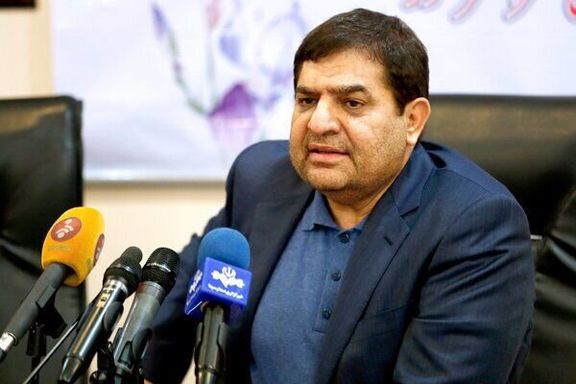
Rezaei recently issued a long directive to all economic officials and cabinet ministers which turned out to be nothing more than suggesting selling oil for food and other staples as a way of circumventing US sanctions, which could work only if Iran's possible trade partners risk being subjected to secondary sanctions.
Apart from Rezaei who has never been holding a position even remotely linked to economic affairs, the other members of President Raisi's economic team come mainly from Khamenei's office and his financial trust or from the administration of the holy shrine in Mashhad, where they worked with Raisi when he was the superintendent for about two years. Otherwise, none has had any executive experience in the government where they have to be more or less accountable for their performance.
Raisi’s officials are not used to checks and balances and the relative transparency of the government operations in comparison to non-accountable financial institutions that work parallel and sometimes totally separate from the government, do not pay taxes, and their operations are not scrutinized by the parliament and the State Auditing Organization.
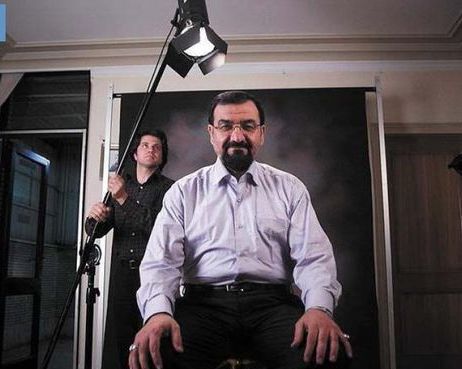
These characteristics are also shared by Raisi's eight economic cabinet ministers, including Industries, Mining and Trade Minister Reza Fatemi Amin whose biggest job previously was the investment manager of the holy shrine's administration.
The highlight in the career of Labor Minister Hojjatollah Abdolmaleki is working at the Office of the Imam Khomeini Relief Committee, a pseudo-charity that operates under the aegis of Khamenei's office and runs various businesses that do not have anything to do with relief work or Khomeini.
Oil Minister Javad Owji's former job as deputy oil minister is not the only activity he is known for. The stories in the press in the 2010s alleged that he was trading oil for gold to help circumvent the sanctions. Road and Urban Planning Rostam Ghasemi was also involved and at one point was called to court for investigations regarding illicit oil trade under Ahmadinejad. On the other hand, Ahmadinejad's Industry and Trade Minister Ali Akbar Mehrabian who was found guilty of piracy and violating an innovator's patent rights is now Raisi's Energy Minister.
Very little is known in the public domain about the track record of Communication and ITC Minister Isa Zarepour and Agriculture Minister Javad Sadatinejad.
Ehsan Khandouzi, who is the Minister of Economy, has very little chance to do any serious work under the conflicting influences of Mokhber and Rezaei. Khandouzi and Mirkazemi are the two key officials who need to tackle the long-standing problems of high inflation, low employment and a more than 50 percent budget deficit, not to mention the problem of a battered currency.
In the meantime, Mirkazemi is also tasked with correcting the country's budgeting system which means depriving powerful religious institutions of hefty budgets they get for doing nothing for the economy. Doing so will turn some of Raisi's supporters into critics.
The Keyword for any success for Raisi's economic team is "coordination". A task difficult to accomplish partly because of the differences among Raisi's top officials and partly because of sudden ad-hoc orders issued by Raisi himself, without consulting anyone when he faces serious issues.